The Passport Papers shed light on the applicants for a Maltese, and EU, passport in the first years of the programme, after the government went through great effort to bury the names of those buying citizenship among lists of naturalised citizens despite claims of transparency.
As part of the joint investigation into the sale of passports with other media partners, The Shift revealed how most applicants who applied for the scheme come from countries where obtaining another country’s passport is frowned upon, if not illegal.
A cache of leaked Henley and Partners’ documents to the Daphne Caruana Galizia Foundation shows that out of 2,325 applications, which includes completed, terminated, withdrawn, and declined applications, more than 1,300 come from Saudi Arabia, China, or Russia – three countries that do not allow dual citizenship, unless through special permission.
While the three countries account for most applications submitted for citizenship, the leak provides insight into the individuals the Malta programme is attracting.
With 229 applications in the leak, Saudi Arabia accounts for the second-largest number of applicants. For Saudi nationals, acquiring another country’s citizenship is illegal, unless special permission is sought.
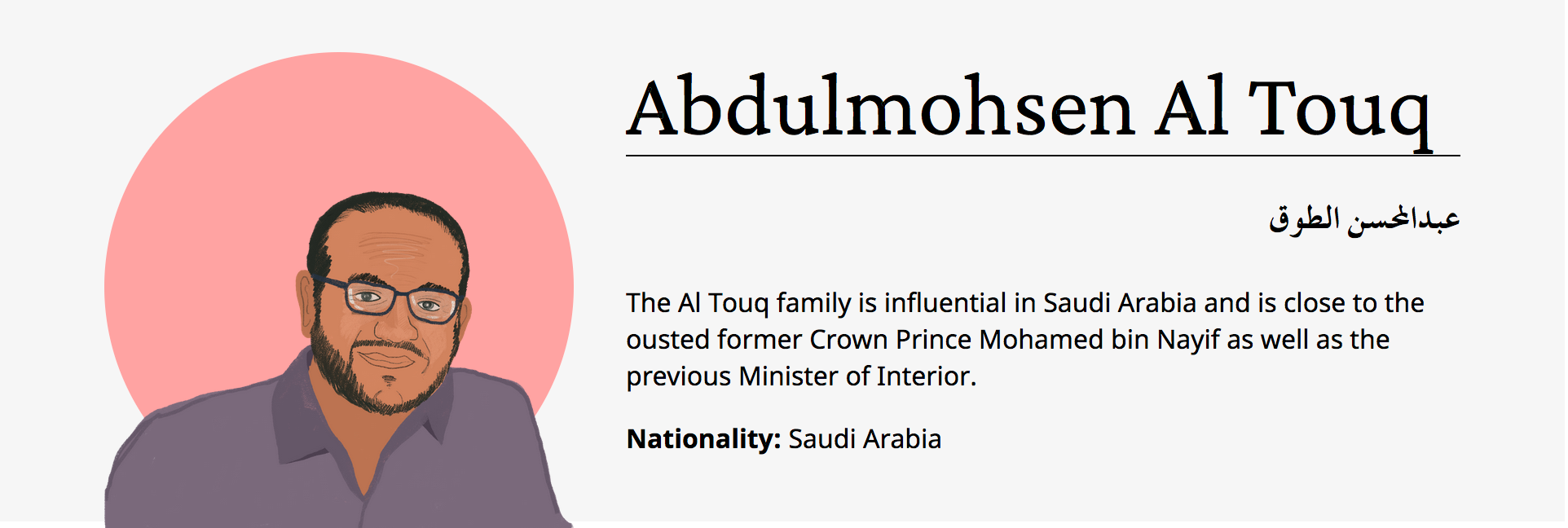
The Al Touq family is influential in Saudi Arabia and is close to the ousted former Crown Prince Mohamed bin Nayif as well as the previous Minister of Interior. The interests of the family’s business conglomerate range from private equity to real estate and span the Middle East.
When applying for Maltese citizenship in August 2015, Al Touq was advised to show “evidential proof of ties to Malta” in the form of a “charity donation of €5,000 minimum” to either the Malta Community Chest Fund or to a named private children’s charity.
Following Abdulmohsen’s successful application, his two siblings Rakan and Saif Al Touq also applied. To meet residency requirements, the three brothers each rented a flat in Malta for €16,200 per year – the minimum to satisfy the rental value requirement laid down by the government of Malta. All three were granted Maltese passports.
Abdulmohsen Al Touq, Rakan Al Touq, Saif Al Touq, and the Board of the Arab National Bank did not respond to multiple requests for comment. Saudi’s Ministry of Culture could not be reached for comment.
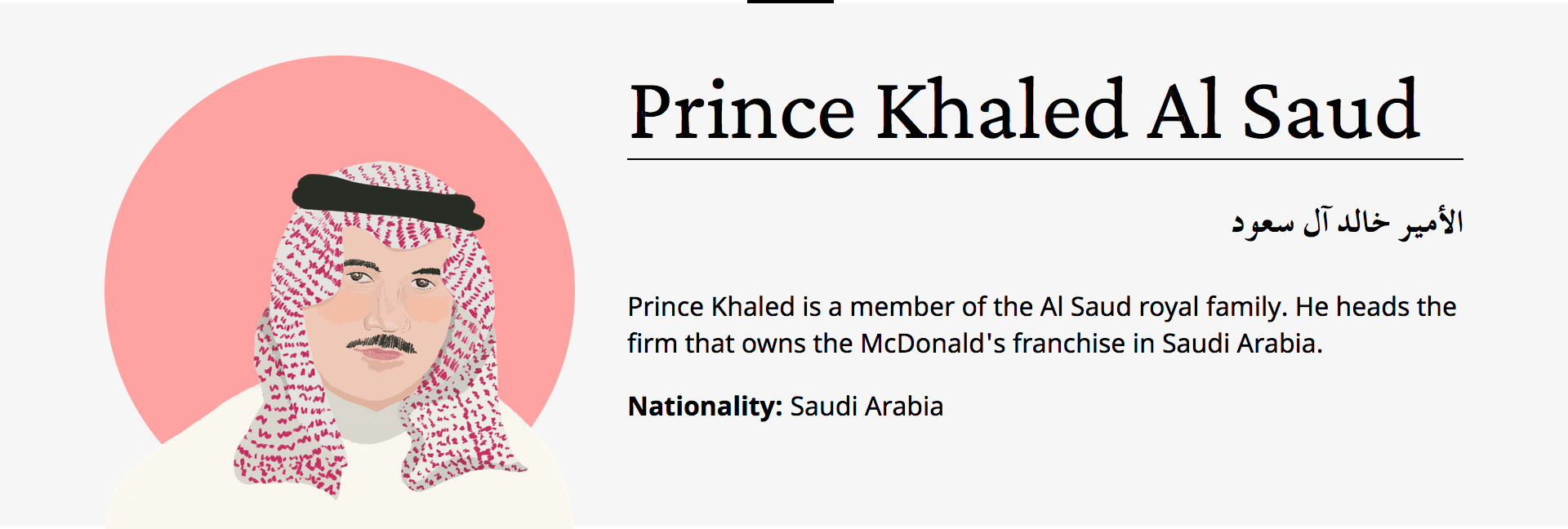
Prince Khaled is a member of the Al-Farhan branch of the Al Saud royal family and the son of Prince Fahad Bin Faisal Al Saud and Muneerah Al Ogail. He is the chairman of Riyadh International Catering Corporation, which owns the McDonald’s franchise in Saudi Arabia.
Prince Khaled applied to buy a Maltese passport in August 2016 and was issued with a letter of approval in January 2017. He applied alone but did so in parallel with his son,s Prince Bander Al Saud and Prince Mishaal Al Saud, who each filed separate applications to buy Maltese passports.
To fulfil the 12-month residency requirement, Prince Khaled leased a flat in Sliema in October 2015, despite declaring a total net worth of US$600 million. An itinerary provided with his application shows that he spent all of two days in Malta before he received his Maltese passport in 2016.
Of note is how Prince Khaled was also able to have his full name withheld from publication in the Malta Government Gazette when he received his Maltese passport. An internal email by a Henley & Partners employee said that after Prince Khaled and his son, Prince Bander, met then-prime minister Joseph Muscat and Jonathan Cardona, the CEO of Identity Malta at the time, they were assured that their names would not be published, despite the legal requirement.
Prince Khaled and Prince Bander did not respond to requests for comment, but Prince Mishaal said that he “suspended” his application upon ‘discovering’ that it is illegal for Saudi nationals to obtain citizenship of any other country and added that he “never met or communicated with (directly or indirectly) any Maltese government official”.

Similarly, in Russia, acquiring another country’s citizenship is ‘not ideal’, especially for high-ranking individuals connected to the administration. Although technically legal, a Russian who gets second citizenship has to face a long list of restrictions.
A source who spoke with The Shift said that since the relationship between the EU and Russia is “far from friendly”, trying to get citizenship of an EU country can be looked at the wrong way, “especially if the persons applying for citizenship have publicly declared their patriotism”.
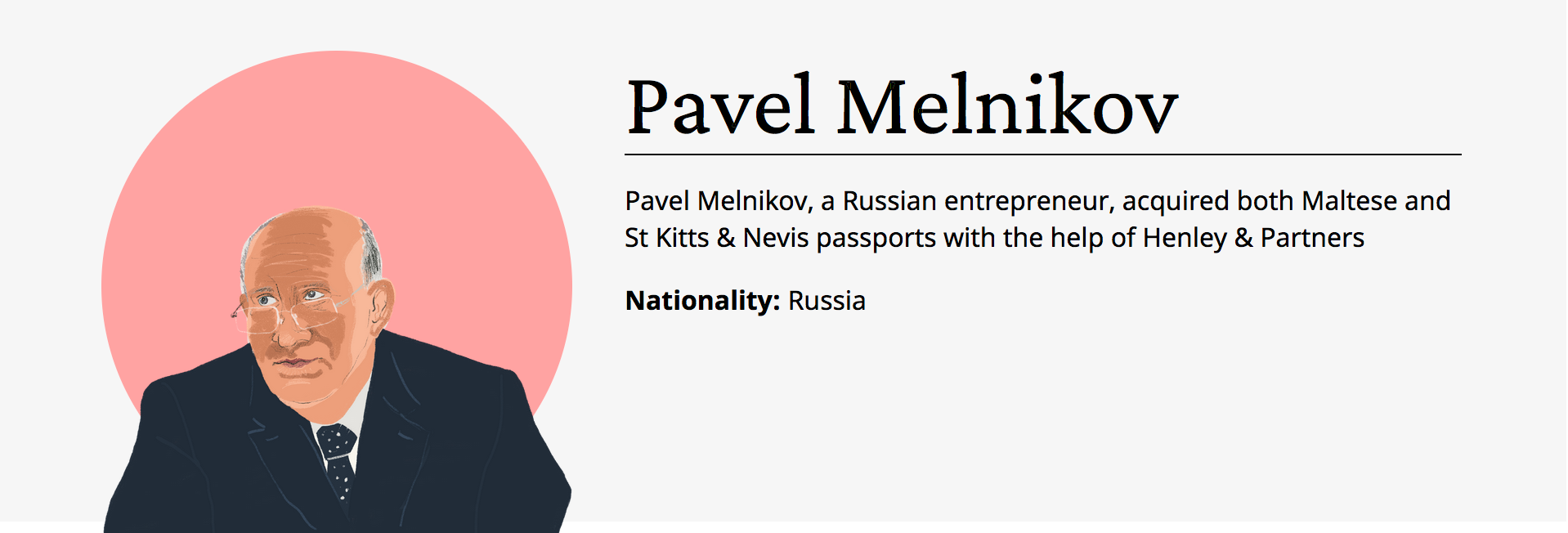
Pavel Melnikov is a Russian entrepreneur who acquired both Maltese and St Kitts & Nevis passports with the help of Henley & Partners. As part of his application process, Melnikov bought two properties at Fort Cambridge, but it is unclear how much time he spent residing there.
In September 2018, Melnikov’s property in Finland was raided by Finnish police and soldiers.
According to The New York Times, this was part of a crackdown on money laundering and tax evasion. Finland’s public broadcaster reported that the searches targeted Airiston Helmi, a real estate firm involved in multi-million-euro property transactions. Melnikov was chair of Airiston Helmi at the time of the raid.
Attempts to contact Melnikov for comment were unsuccessful.

In the cover letter for his 2015 application, former PetRoNeft owner Roman Trushev cited Malta’s European Union membership, stable economy, educational opportunities and climate, among reasons to purchase Maltese passports for himself and his extended family and all received their Maltese passports in 2016.
Trushev has not returned to Russia since the country’s prosecutors lodged criminal conspiracy charges against him related to polluted oil from one of his plants that contaminated oil exports to Europe.
Asked about his current links to Malta, Trushev said that he has “economic interests” in the country related to real estate but declined to provide more detail. He said he had visited Malta many times before applying for a passport, during the application process and after receiving his passport.
He also said he had bought an apartment in St Julian’s for €560,000 which he lived in with his family and added that he sold the property in 2018 as part of his real estate business and has since “been renting a large apartment”. It is not clear how much time Trushev and his family spend residing in Malta.
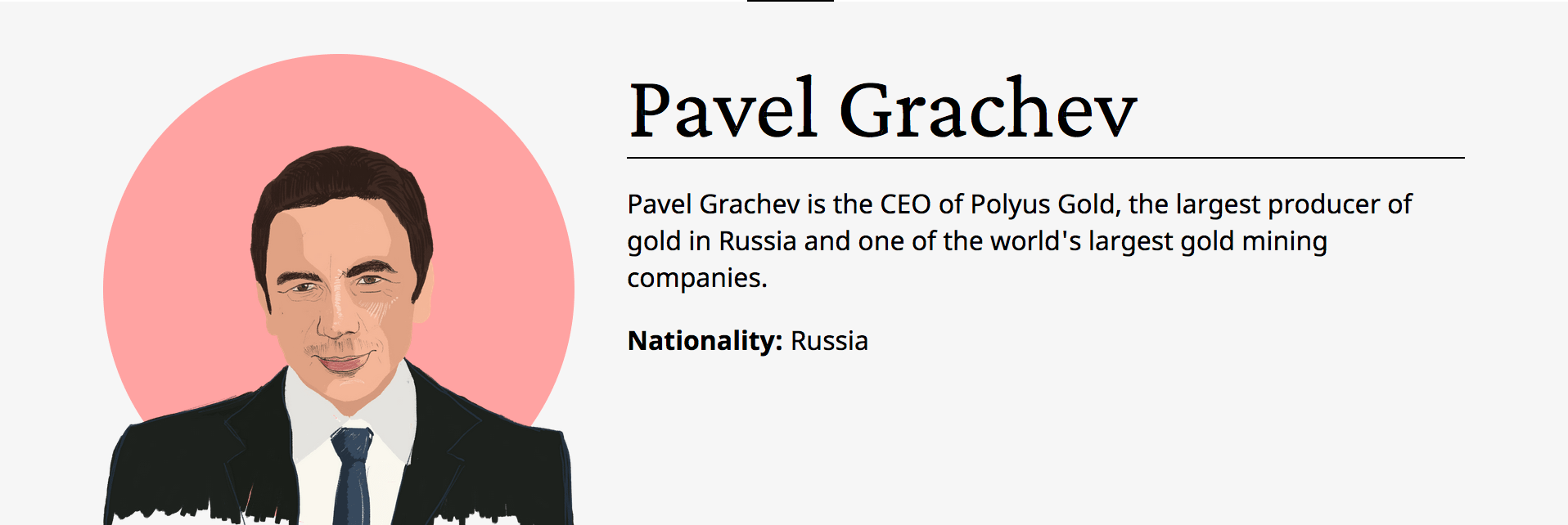
Pavel Grachev is the CEO of Polyus Gold, the largest producer of gold in Russia and one of the world’s largest gold mining companies.
During the application process, Identity Malta asked Grachev to explain his relationship with Suleyman Kerimov, the Russian oligarch sanctioned by the US. This is because Kerimov’s son, Said Kerimov, formally controls a majority of shares in Polyus Gold to which Grachev claimed to have only “very occasional interactions with [Suleyman Kerimov] personally”.
To meet the 12-month residency requirement, Grachev rented a flat at Portomaso in St Julians for €2,800 per month and in 2014 spent less than 10 hours in Malta.
Other application documents Grachev supplied, intended to show a “genuine link” to Malta, include cards used for travel on public buses, a loyalty card for a bookshop and a receipt for chartering a boat. Tickets to a heritage site costing €22.50 are labelled “cultural links with the islands”. Grachev and his family received Maltese passports in 2017.
When contacted for comment, Grachev said through a spokesman that his application was subject to all the rules governing the passport-for-cash scheme and that all the information provided was truthful.
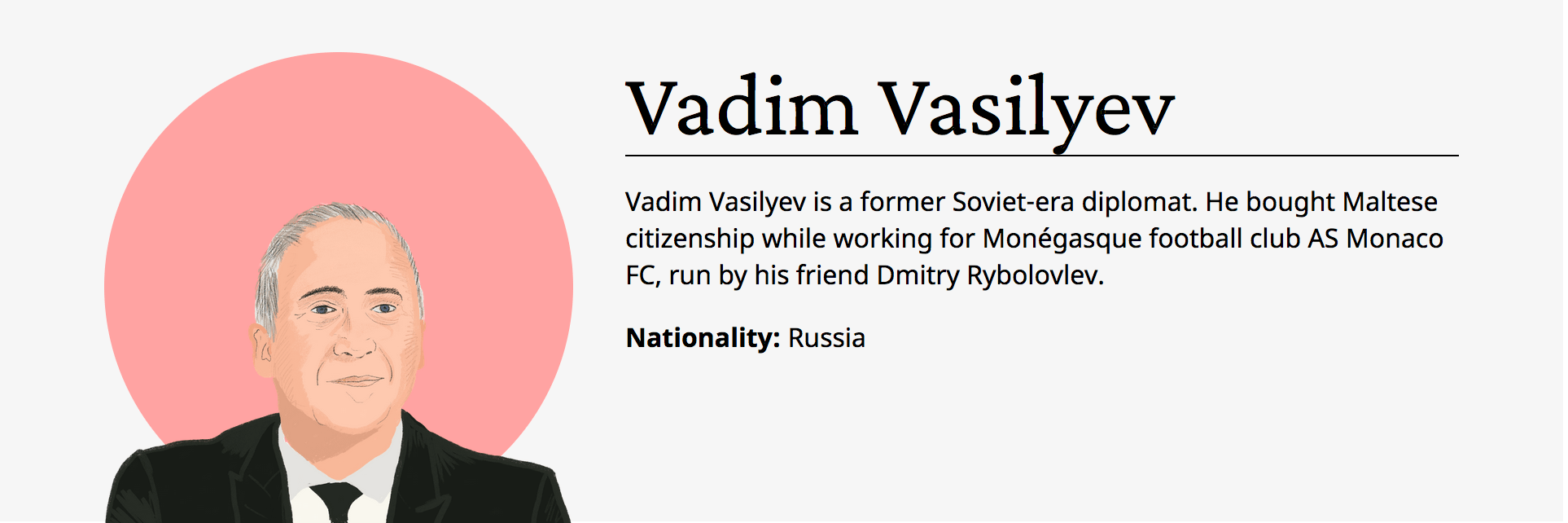
Vadim Vasilyev is a former Soviet-era diplomat who served at the USSR embassy in Iceland between 1987 and 1990. In 2013, he joined the Monégasque football club AS Monaco FC, run by his friend Dmitry Rybolovlev, where he served as CEO and vice-president until 2019. He now runs his own Monaco-based firm, VV Consulting.
In 2014, Vasilyev applied to buy Maltese passports for himself and his family. In the process of securing a Maltese passport, Vasilyev visited the training grounds of an amateur football club in 2015 and donated football jerseys worth less than €500. He also donated €15,000 to a children’s charity in Malta run by a religious order.
Vasilyev’s application pack included flight tickets and a car rental invoice with no amount on it. These were accepted as evidence of residency by Identity Malta but also indicate that he spent less than five days in the country.
During one of his visits to Malta, Vasilyev met with Joseph Muscat. In comments to one of the consortium partners, Vasilyev said he was told by Henley & Partners that Muscat occasionally met with “selected applicants” and that, as a football fan, he would be interested to meet Vasilyev.
Vasilyev has set up two companies in Malta to hold and operate his assets. He told a member of the consortium that he chose Malta over other jurisdictions because the country allowed him to realise his dream of becoming a European citizen.
His second trip to Malta was in March 2016 to collect documents, lasted less than two days, and included a meeting at the “sports ministry”. He received a Maltese passport shortly after. He now visits the island “from time to time”.
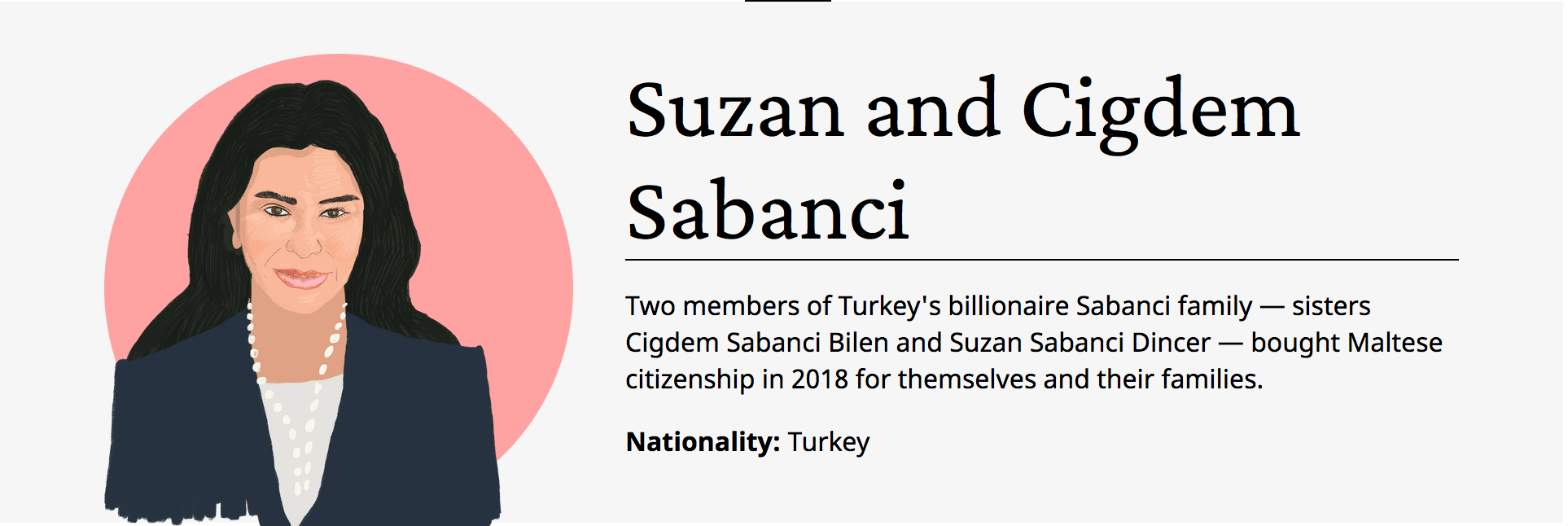
Two members of Turkey’s billionaire Sabanci family — sisters Cigdem Sabanci Bilen and Suzan Sabanci Dincer — bought Maltese citizenship in 2018 for themselves and their families.
Forbes estimates that the fortune of the Sabanci family is in the range of billions, deriving from their majority ownership of Sabanci Holding, one of Turkey’s largest business conglomerates. The sisters began the process of applying to buy Maltese passports for themselves and their respective families in 2016.
To meet the residency requirement, the sisters rented an apartment in Portomaso, St Julians, for €3,000 per month. Suzan Sabanci Dincer leased an apartment in Sliema for the same amount, signing an agreement in January 2016 and terminating it in October 2017.
The sisters visited Malta in September 2016, landing at 11am and departing three and a half hours later. To tick a “genuine links to Malta” box, Suzan Sabanci Dincer, one of the two applicants, donated €10,000 to the Malta Community Chest Fund.
All family members of Suzan Sabanci Dincer and Cigdem Sabanci Bilen’s applications were granted Maltese passports in 2018.
Cigdem Sabanci Bilen, Suzan Sabanci Dincer, Sabanci Holdings and Akbank did not respond to requests for comment.
Those that didn’t make the cut

The investigation also revealed other controversial individuals such as Low Taek Jho, an international fugitive accused of stealing billions in Malaysia’s largest-ever corruption scandal. According to documents from the US Justice Department, US$4.5 billion dollars were misappropriated from 1Malaysia Development Berhad, a fund created to promote economic development in Malaysia.
Low is commonly considered to be the mastermind behind the misappropriation scheme, an allegation he has consistently denied.
Low applied to buy a Maltese passport in 2015 but Henley & Partners’ response was that he would “pose undue reputational risk and/or disrepute to Henley & Partners therefore the prospect is not eligible to apply for any other programme or services offered by Henley & Partners”.
However, records seen by the Passport Papers consortium indicate that the firm issued invoices to Low and that they were paid. After Low’s attempt to purchase a Maltese passport failed, he obtained Cypriot citizenship with the help of a property purchase facilitated by Henley & Partners subsidiary Henley Estates in 2016.
Jho’s whereabouts remain unknown. Low Taek Jho, Jynwel Capital, and Shaher Awartani did not respond to multiple requests for comment.
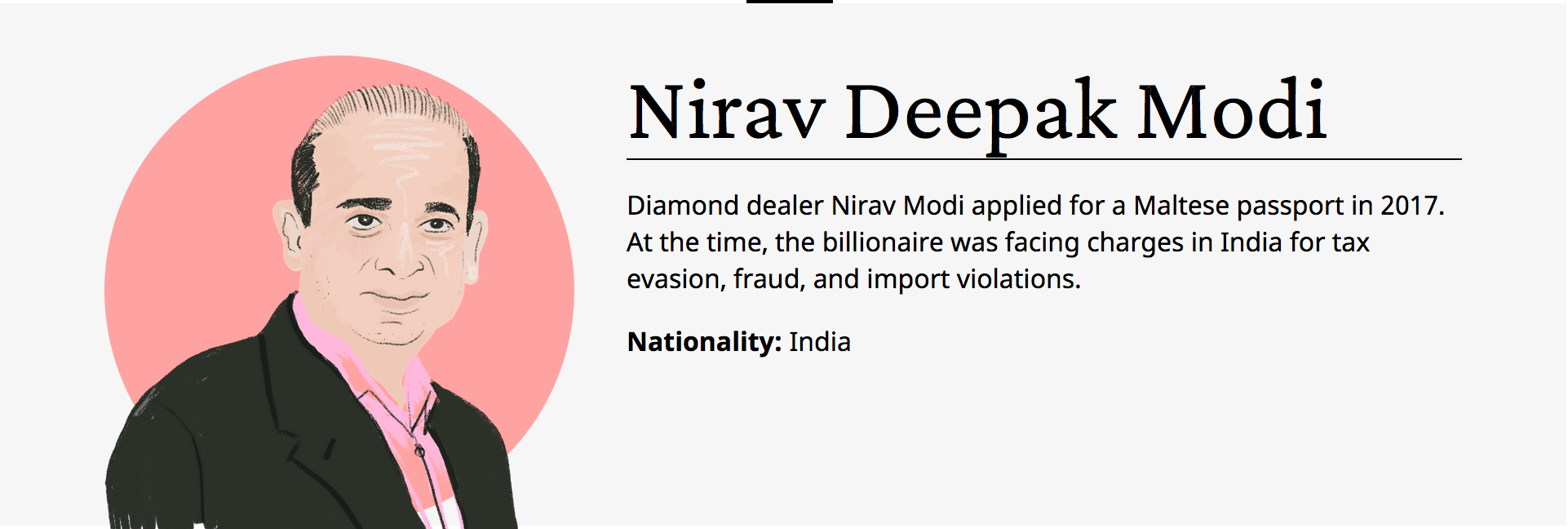
Diamond dealer Nirav Modi applied for a Maltese passport in 2017. At the time, the billionaire was facing charges in India for tax evasion, fraud, and import violations for allegedly diverting high-quality diamonds to the domestic market duty-free, while exporting lower-quality diamonds.
Citing these charges in April 2017, Henley & Partners decided not to proceed with Modi’s application because, like Low Taek Jho, it “would pose undue reputational risk and/or disrepute” to the firm. However, a senior manager then told Modi’s representative in an email that they would be able to review Modi’s case if he had “supporting documentation” to address their concerns.
Henley & Partners statement
In a statement, Henley said it was aware of potential risks in handling client applications and it had “invested significant time and capital in recent years to create a governance structure that is committed to the highest of standards, with due diligence at its heart.”
It stressed that it had always observed local laws in countries where it operates and added that it had advised the Maltese government on establishing an independent regulator for the scheme.
“We assisted the Maltese government in the creation of a remarkably successful sovereign financing and economic innovation platform, raising hundreds of millions of euros in debt-free capital,” the firm said. “Our processes are well documented and are significantly more advanced than those of the majority of other investment migration industry participants.”
Full statement here.
This is a joint investigation by The Shift and other partners, coordinated by the Daphne Caruana Galizia Foundation. The production of this investigation was supported by a grant from the Investigative Journalism for Europe (IJ4EU) fund.
Investigation for The Shift by Gabriel Schembri, Alice Taylor and Caroline Muscat.


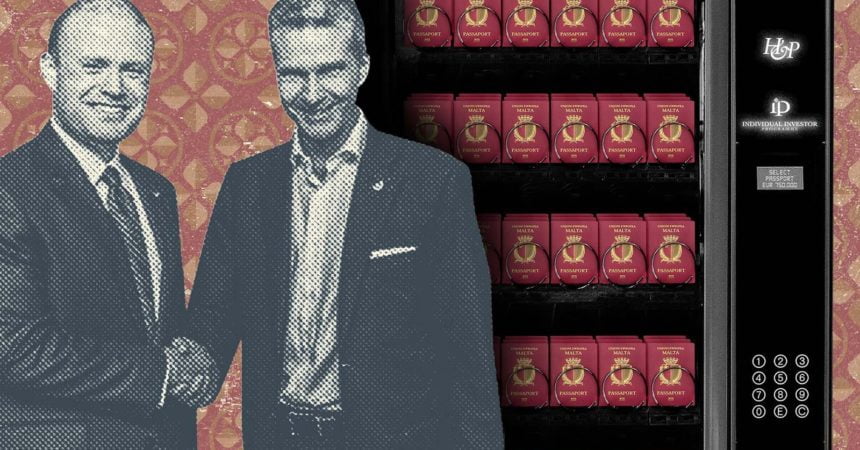











Well done to Gabriel Schembri, Alice Taylor and Caroline Muscat.
Hats off to The Shift. I always enjoy your excellent high-quality investigative journalism.
The importation of foreign new mafia clans, thanks to the Toxic Dodger I and H&P.
All corrupt gangsters were given the Maltese passport booklet.
What about the george’s (the president’s ) community chest fund and the local Church has to say about these donations ?